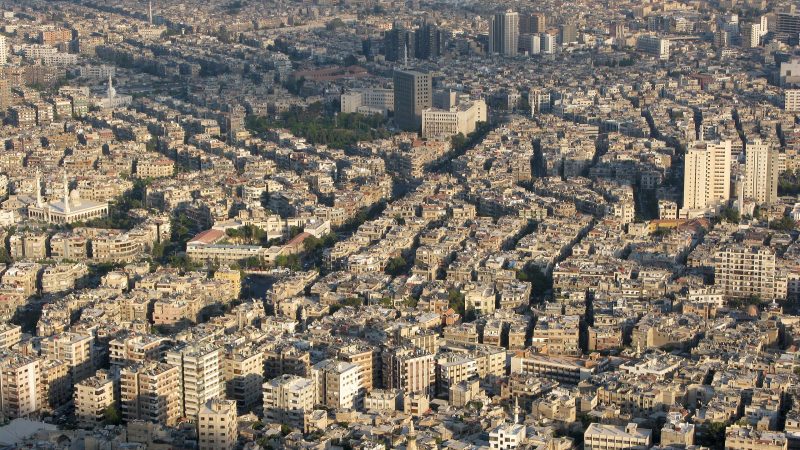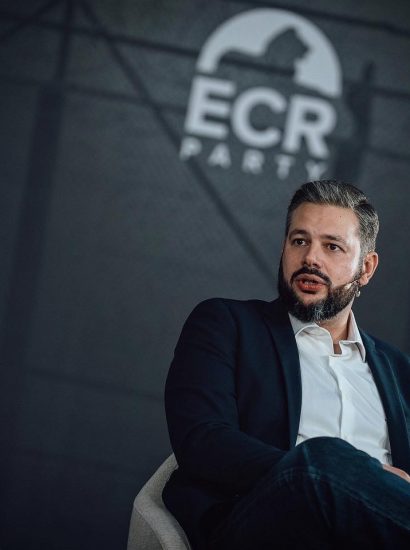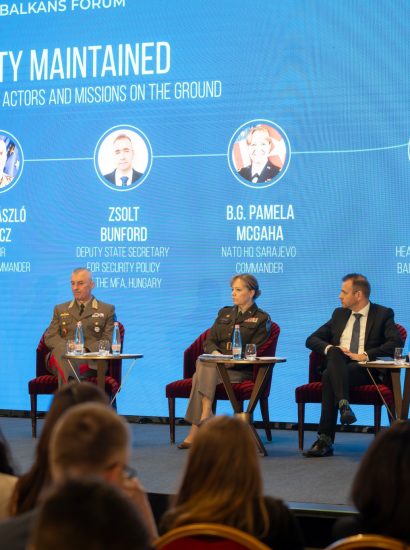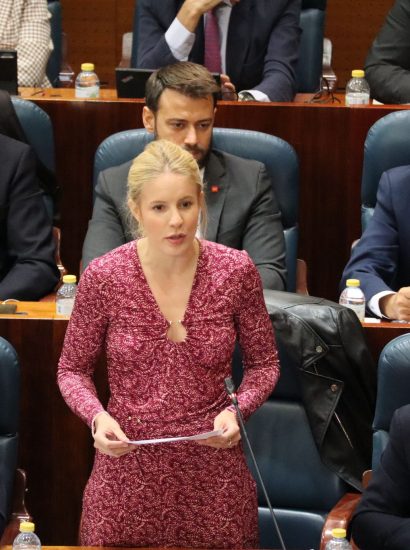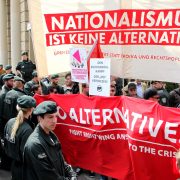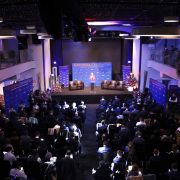Conflicts we see in the Levant region are less about Islam and more about nation-building, says Professor Joshua Landis, a Sandra Mackey Chair and Director of the Center for Middle East Studies and the Farzaneh Family Center for Iranian and Persian Gulf Studies at the University of Oklahoma in the Boren College of International Studies. He is also a frequent contributor to professional outlets, such as Foreign Policy, and he is also author of the book Syria at Independence: Nationalism, Leadership, and Failure of Republicanism, coming year. He is a frequent analyst on TV, radio, and in print and is a regular on NPR, Al-Jazeera and the BBC.
I’d like to start out with the “Great Sorting Out”. Could you explain what this notion represents for Syria and the Levant region?
The Great Sorting Out is a term originally used by Tony Judt to describe what happened in Central Europe during 1944-48. In those years, 31 million people were ethnically cleansed in the name of nation-building. Poland was 64 percent Polish in 1937; by 1949, it was 100% Polish. Czechoslovakia had 32 percent minorities before the Second World War, which included Sudetenland Germans and Jews. They were wiped out during the war or in the years immediately after, such as in the case of the German speaking minority which was accused of collaborating with Hitler.
In the many new states created out of the multi-ethnic and multi-religious empires of that were destroyed in World War One, stretching from Poland to Palestine – nine in Europe and over ten in the Middle East – different communities of people were trapped together within the newly established nation-states; many of them did not want to live together and did not trust each other. I call these new states created at the Paris Peace Conference, the class of 1919. Nation states do not deal well with minorities and sub-national identities. They expect their people to speak one language and strive to be homogeneous.
The failure of the states of 1919 to digest their minorities peacefully was universal and led to long and bloody conflicts. For minorities, it was usually a zero-sum game.
In almost all cases, the borders remained the same and the people were changed to fit the borders. Yugoslavia was the exception that proves the rule. It was broken up into seven separate nations to provide each of its major religious or ethnic communities a state of their own.
In the Middle East, I argue that many of the recent conflicts should be understood in the context of nation-building and the Great Sorting Out.
A major difference distinguishing the new European states and Middle Eastern states created in 1919 is that many of the Middle Eastern states were ruled by foreign powers during the inter-war years, which meant that minorities were given a leg up and led to minorities inheriting or seizing the lion’s share of power once the colonial powers departed. In many of the recent civil wars in the Levant countries, such as those of Lebanon, Syria and Iraq, what we witness is the majority population trying to overthrow the minority ruling group. In Lebanon, the Maronite Christians gained the lion’s share of power; in Syria, it was the Alawis; and in Iraq, the Sunnis. I would argue that even the Israeli-Palestine conflict fits into this model. The Jews, who were a small minority in Palestine under the Ottoman Empire, were favoured by the British and were able to turn themselves into the majority, through war and by both the expulsion of two-thirds of the Arab population during the 1948 war and by the ingathering of Jews who were being “sorted out” of their traditional homes in both Europe and the Middle East.
This model of the Great Sorting Out explains why minorities of all kinds have been in sharp decline in the Middle East as they pay the highest price in the nation-building process.
The number of Christians in Turkey went from 20 percent of the population in 1914 to less than 1 percent in the 1920s. In Iraq, Syria, and Palestine, the share of Christian population has been in free fall. In Syria, the Alawi community feared ethnic cleansing, in the face of uprising by the Sunni majority, which explains why the civil war was so bloody and destructive. When I was giving advice to the US State Department about Syria, I used the Great Sorting Out to explain to them that the conflicts we see in the region are less about Islam and more about nation-building. We saw the same thing play out in Europe in the past.
The conclusion that I would try to draw from this model was that the U.S. could not hope to overthrow Middle Eastern dictatorships and replace them with democracies.
The result has not been successful power-sharing governments, but instead would be civil war and the triggering of the bloody process of the Great Sorting Out.

A demonstration of Kfar Saba’s residents against British rule in Israel (Source: Wikimedia Commons)
The Assad family belongs to Syria’s Alawite sect. What do they have to fear in Syria?
The Alawite minority’s share of the Syrian population is approximately 12 percent. It’s a minority ruling the 60-70 percent Sunni Arab majority. The Assad family has managed to rule with the help of the army and at times brutally. We shouldn’t forget the 1982 Hama massacre against the Muslim Brotherhood, when more than 10 thousand people – mostly Sunnis – were killed. I was living in Damascus when the Hama uprising took place. The radical wing of the Muslim Brotherhood took over downtown Hama, executed some 50 Baathists and called for Jihad. The subsequent massacre was disproportionate and brutal. It many ways, it was a dress rehearsal for the 2011 uprising that started as part of the Arab Spring. Alawites feared retribution for their past actions, which goes some way to explain why they responded as violently as they did.
There is a religious fear as well. While most people from the outside consider the Alawis to be close to Shias because they both revere Ali, there are important differences between the two religions.
When I asked Iranian Ayatollahs whether they consider Alawis to be Shi’a, they have responded with big smiles. Both Shi’a and Sunni clerics don’t consider Alawis to be good Muslims. The belief that they are “ghuluw,” extremists, or “murtaddiin, apostates, is widespread. During the civil war extremist groups, such as ISIS, al-Qaeda, and Islamist militias executed Alawis with little hesitation. Indeed, both sides were ruthless. Religious differences made things much worse.
In Syria, the Alawites make up the majority in the coastal region. There were rumours in 2012-13 that the Assad regime and its supporters could flee there and continue to rule from that territory. The French tried creating an Alawite state between 1920-1936. Could partition be a solution for Syria’s Alawites or Kurds?
This question relates to the Great Sorting Out. Could the solution be similar to the break-up of Yugoslavia?
The issue in Syria is that partition into a Kurdish, Druze, Sunni and Alawite state would leave many people defenceless.
Also, the creation of an independent Alawite state would block the mainland’s access to the Mediterranean Sea. The US supported Kurdish-majority region – the Rojava – has most of the oil and agricultural resources. How would the remaining newly created states get their energy and food? What would happen to the mixed Sunni-Alawite towns in central Syria around the town of Hama? Partition in theory could solve many issues, but the reality is that it would create new set of problems. There was international oversight and forces deployed on the ground in Yugoslavia. That isn’t the case in Syria.
Considering Iran and its militias growing influence, do you think that the Shia religion may gain a stronger foothold inside the country?
This is a constant anxiety among Syria’s Sunni population. They fear that Iran and the Alawites are going to carry out conversion campaigns and change the demographic balance. I think most of those anxieties are unfounded. It’s very difficult to convert Syrians from one religion to another. Western missionaries didn’t manage to convert Muslims to Christians during the colonization. It’s true that some Sunni tribes in the countryside converted to Shi’a; however, it’s questionable if they really believe in it. They’re likely going where the wind is blowing. It’s rather their strategic than religious decision.
The real anxiety for Syria’s Sunnis is that politically Shias could get an even stronger foothold in the Levant region. We shouldn’t forget that between Lebanon, Syria, Iraq and Iran there are more Shias than Sunnis. This is shocking for Syria’s Sunni elite, who were accustomed to have power in Damascus. Now they see that Hezbollah and Iran have strategically allied themselves with Assad in Damascus and that Shia groups are on the rise. Syria’s Sunni elite fear being completely pushed aside. So, the real anxiety is more political, rather than religious.
Turning to 2011 and the beginning of the conflict in Syria. You were one of the few people who wrote back then that the regime would not fall easily, it will fight for its survival. How did it manage to stay intact and successfully resist the opposition?
Syria and the Assad regime moved away from republicanism towards monarchy. It’s important to remember that Syria had a democracy after independence in 1946, even if an unstable one. Hafez al-Assad, the father of the current president, changed the structure of his regime when he took power in 1970. His sons and relatives joined the army, along with loyal Alawites. He groomed his sons for succession, effectively creating a dynasty and monarchy.
Similarly, many Arab governments moved from a republicanism to a dynastic monarchy in the order of the Ottoman empire. Jordan, Morocco and the Gulf States are prime examples in this.
They saw that republicanism wasn’t working as their nations were so fragmented. There was a lack of a civic national identity. Furthermore, we know from the Arab Spring that it was the monarchies which survived. They didn’t have significant movements to overthrow them. Of course, Bahrain is an exception, but that relates to sectarian issue. Republics on the other hand faced a terrible onslaught during the Arab Spring.
The other side of the same coin is the disunity amongst the rebels. The Sunni elite which wanted to overthrow the Assad regime splintered into thousands of different rebel groups. They spent more time fighting each other than the Assad regime.
It caused the West to abandon the rebels, because they didn’t have a national vision as much as an Islamic vision. That was their downfall in the eyes of the West.
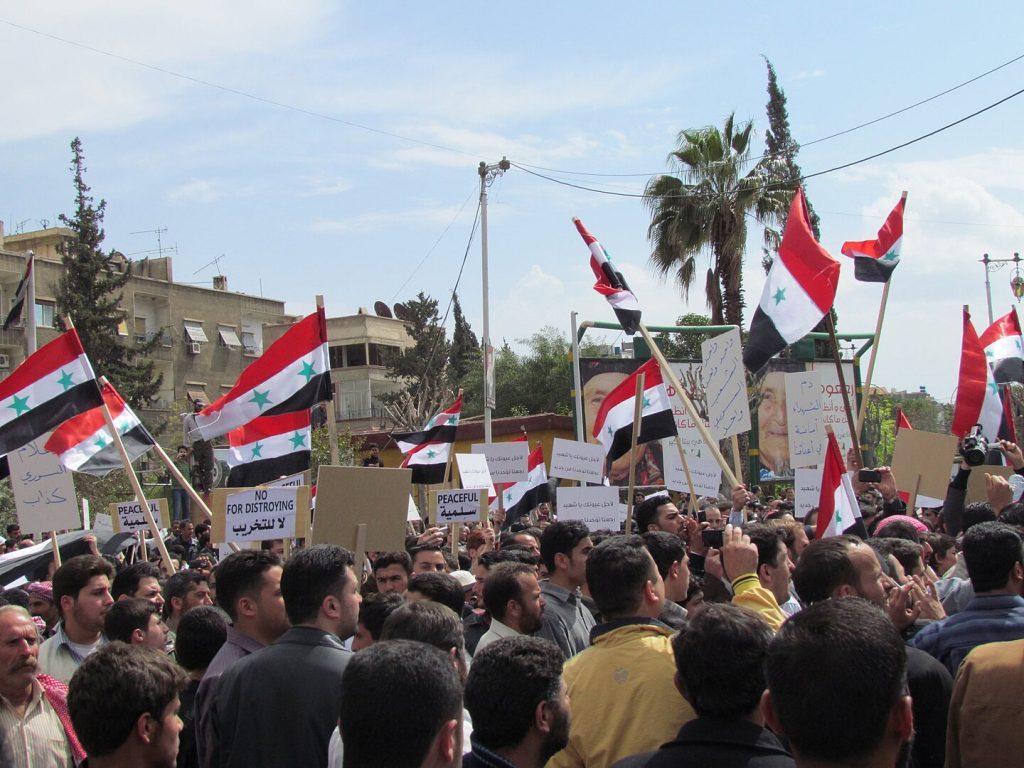
Anti-Assad demonstrations in Douma, 8 April 2011 (Photo: shamsnn / Wikimedia Commons)
Many people in the West blame Russia for the survival of the regime. But it was really the West that by 2013 concluded that the Syrian army shouldn’t collapse. Because without a national army there is no national identity. Washington believed that the army had to stay intact in order to fight Islamist forces. That policy also gave a strong hand to the regime.
Assad has won, nevertheless the economic price is massive. There’s an oil and gas shortage. Electricity comes on 1-2 hours a day for most Syrians in regime-held territory. What can Damascus do to resolve the energy issue?
Fundamentally, the western policy of strangling Syria economically is working. Sanctions don’t allow foreign investment. The UAE announced in 2021 that it wanted to build a PV plant north of Damascus. It couldn’t do so, because sanctions forbid companies to participate in reconstruction. One of the major strategies of Western sanctions on Syria has been to deprive the country of energy.
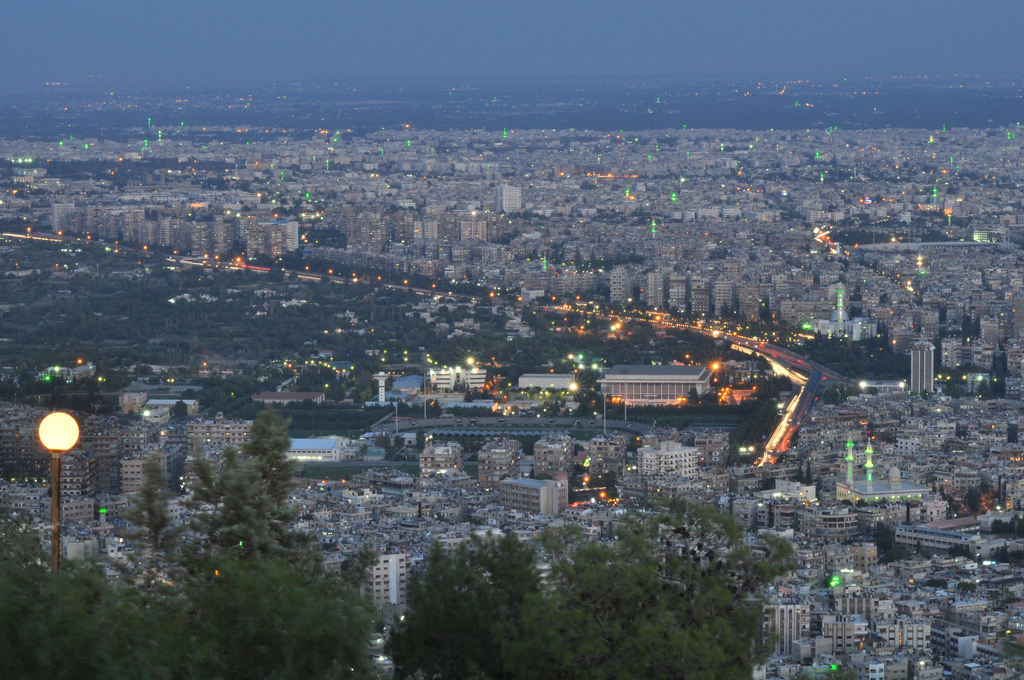
View of Damascus, Syria (Photo: Lazhar Neftien / Wikimedia Commons)
Furthermore, oil tankers are not allowed to supply the regime. The port they normally dock to – in Banyas on the Mediterranean coast – is controlled by the government and the Assad family. Since Bashar al-Assad is sanctioned and would receive transit fees from the port, ships can’t unload. The owners of the ships could be sanctioned. No major company will insure the tankers going to Syria. This limits Syria’s import-potential. Over a dozen Iranian oil tankers have been scuttled by Israel with limpet mines as they were one their way to Syria. This effort to stop Syria from getting fuel is coordinated with the U.S.
The answer for the lack of electricity and energy would be for the sanctions to be lifted. That would mean allowing foreign investment and for trade to re-open.
Syria has enough oil and gas for self-sufficiency, but those sources are in the northeast of Syria and are under the control of American and Kurdish forces. Ultimately, that region needs to be reintegrated in order to provide energy for Syria’s power plants.
What can smaller European nations do to improve the relations with the Syrian government? Do they have some room for maneuver?
I think it’s very important that countries like Austria, Hungary and Greece continue to keep lines of communication with Syria open. Nevertheless, this can be a dangerous undertaking. There was a Romanian company that was sanctioned by the US and had to pay almost a million dollars in penalties. It was shipping wood and some basic construction material. It was targeted by US sanctions as a warning-shot to other entities which were thinking of participating in the reconstruction.
It’s important for smaller European states to keep the idea of reintegrating Syria alive. Because the policy of isolating Syria and economic sanctions is a very destructive one. It will not change the regime, it only causes people to suffer. It’s a misleading policy, and I think that it’s done in a large part to please Israeli interests.
We’ve seen protests by the Druze community in the regime-controlled south of Syria since September. The protestors have burned pictures of Bashar al-Assad, waved their own six-coloured flag and recently even the rebel flag. Can we expect a regime crackdown?
We have to assess the threat of the Druze region to Damascus. The Druze are poor. Their region lacks water and it needs electricity. One of their most important products are apples. Usually farmers store their apples in refrigerators in order to sell them in the winter. Now, without electricity, they can’t store them in order to sell in the offseason. That’s when the demand is high, and the supply is low. That would require state planning and help, which is currently non-existent. There’s no profit. The Druze have been suffering tremendously.
Furthermore, the Druze will not join the Syrian opposition. The leadership of the Druze anti-regime demonstrations made it very clear that they will not submit to outside powers, meaning the Sunni elite, the driving force of the revolution.
The Druze leadership won’t give up authority and be organised by the Sunni opposition. And the regime doesn’t want to take action which would push the Druze towards the opposition either.
Remember, that an important part of the opposition doesn’t even consider the Druze Muslim. We’ve seen Al Qaeda and ISIS destroy Druze shrines and calling them apostates.
The Druze are in a situation where they’re part of Syria, and a part of them oppose the regime, but they can’t join the opposition. Damascus is playing the long game of divide and conquer.
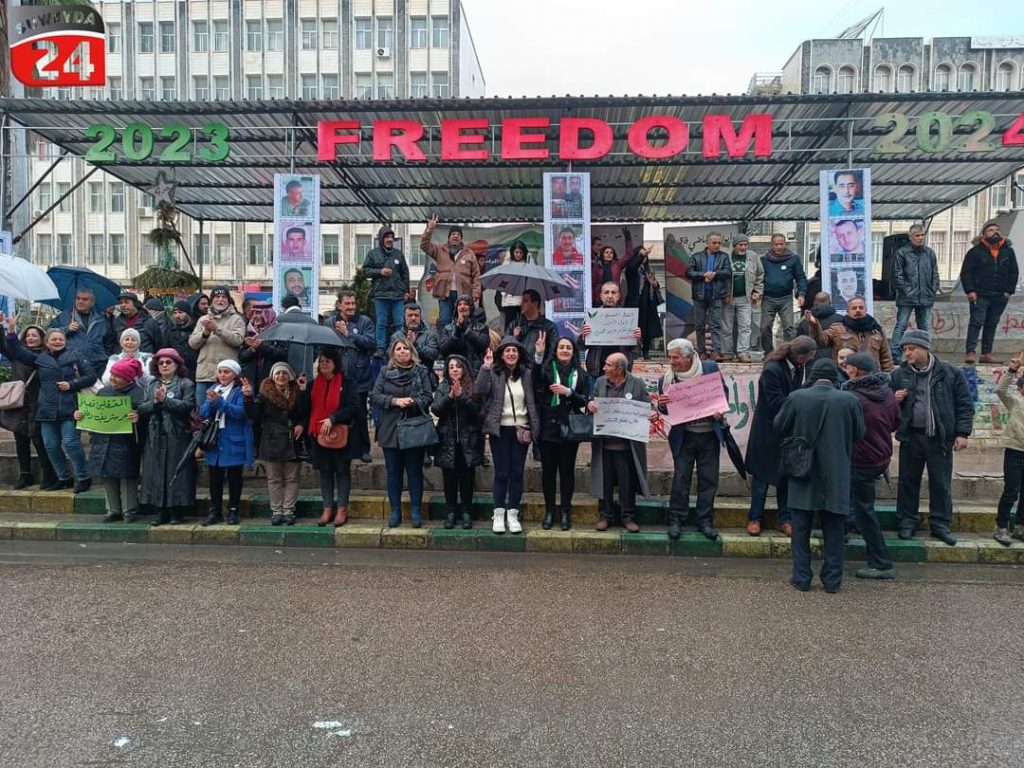
Syrian women and men protesting in the Druze capital Sywayda’s al-Karama square (Source: Suwayda24 / Twitter)
How can the war in Gaza influence Syria and how do you see America’s role evolve?
The U.S. has played and incredibly detrimental role in the country. We shouldn’t understate the importance of the Israeli lobby and interests in Washington.
Israel wants to keep Syria divided and weak. Presently, with Washington’s help, Syria’s military threat against Israel is very limited.
The current war in Gaza has given the opportunity to Hezbollah, the IRGC and other resistance forces to try to drive out the American forces in Syria. We see rocket attacks almost on a daily bases against American bases throughout the country. They’re using the war in Gaza to keep up the pressure. Their goal is the departure of the American forces.
Before the revolution you lived in Syria and visited the country extensively. For you personally, do you have any hopes in returning?
The security forces kicked me out of the country a number of times before, the latest in 2009. It was only thanks to the Syrian ambassador in Washington and Bouthaina Shaaban – an influential advisor to the president – that I could still visit. They defended me at the presidential palace.
Later, once the uprising started, I wrote a very divisive article. I published it early in the war, when the government started using fixed-wing aircraft to bomb people. I felt that because of that the war would escalate into an even more destructive phase. In response, there was an hour-long program on Syrian TV the day after. It was about how “Joshua Landis is an Israeli spy and an evil person”. Since then, I’m permanently banned. Under this regime at least.
I still got family in Syria, through my wife who is from Lattakia near the Mediterranean coast. However, the article that I wrote means that I can’t go back. It also limits the possibilities for my children to see their extended relatives. The cost for my family has been relatively low, compared to other Syrians. Nevertheless, we lost a part of our identity. We’ve been deprived of that in our lives.
Professor Joshua Landis is Sandra Mackey Chair and Director of the Center for Middle East Studies and the Farzaneh Family Center for Iranian and Persian Gulf Studies at the University of Oklahoma in the Boren College of International Studies.
He manages SyriaComment.com, a newsletter on Syrian politics and publishes frequently in policy journals such as Foreign Affairs, Middle East Policy and Foreign Policy. His book, Syria at Independence: Nationalism, Leadership, and Failure of Republicanism, will be published by the Arab Center for research and Policy studies this coming year.
He is a frequent analyst on TV, radio, and in print and is a regular on NPR, Al-Jazeera and the BBC. He has lived 15 years in the Middle East and 4 in Syria. He spent most summers in Syria before the 2011 uprising. He was educated at Swarthmore (B.A.), Harvard (M.A.), and Princeton (Ph.D).
To watch Professor Landis’ October 2023 appearance on Al-Jazeera’s Inside Story about the Druze protests click here. To access his Wikipedia biography, click here. His past articles on SyriaComment, including interviews and analysis are accessible here.

